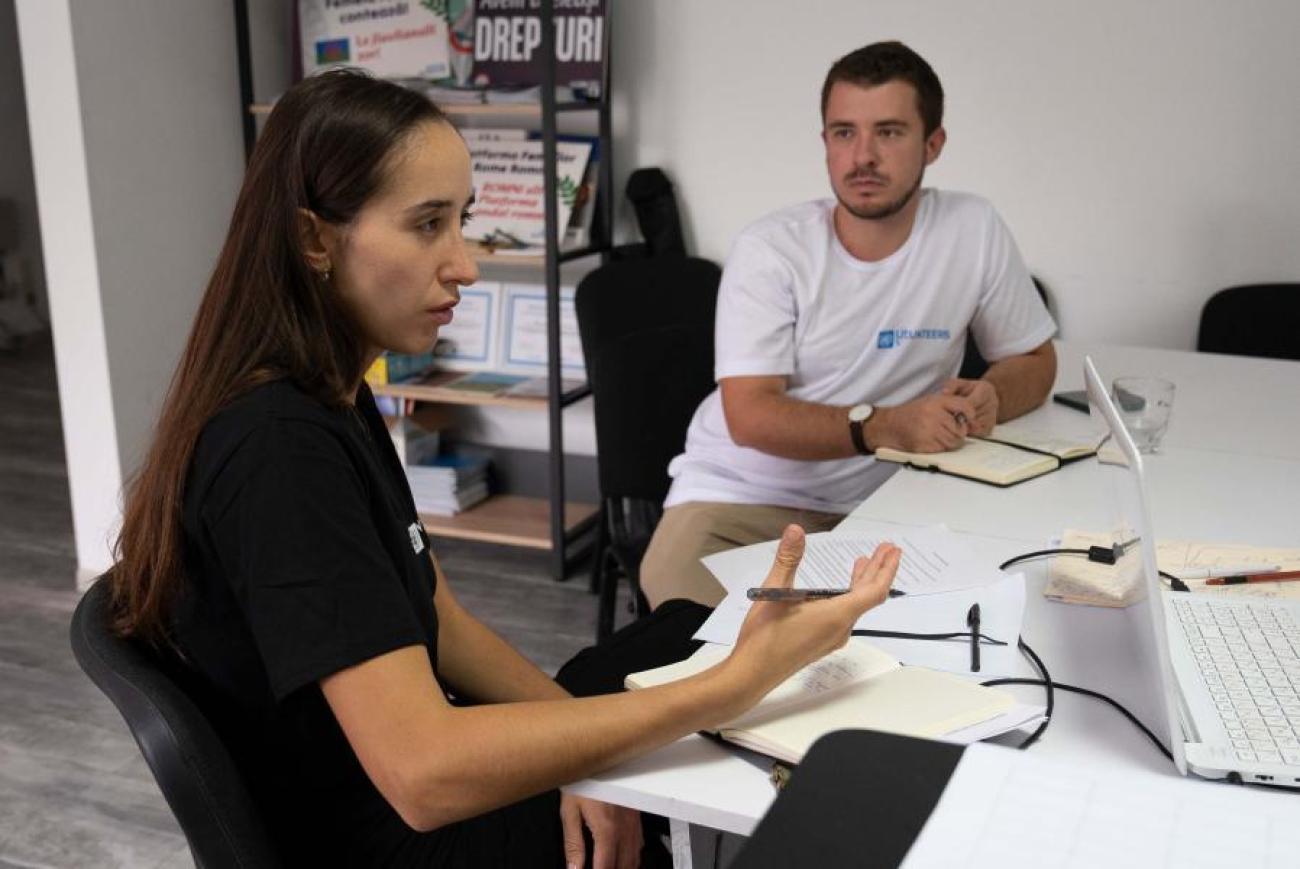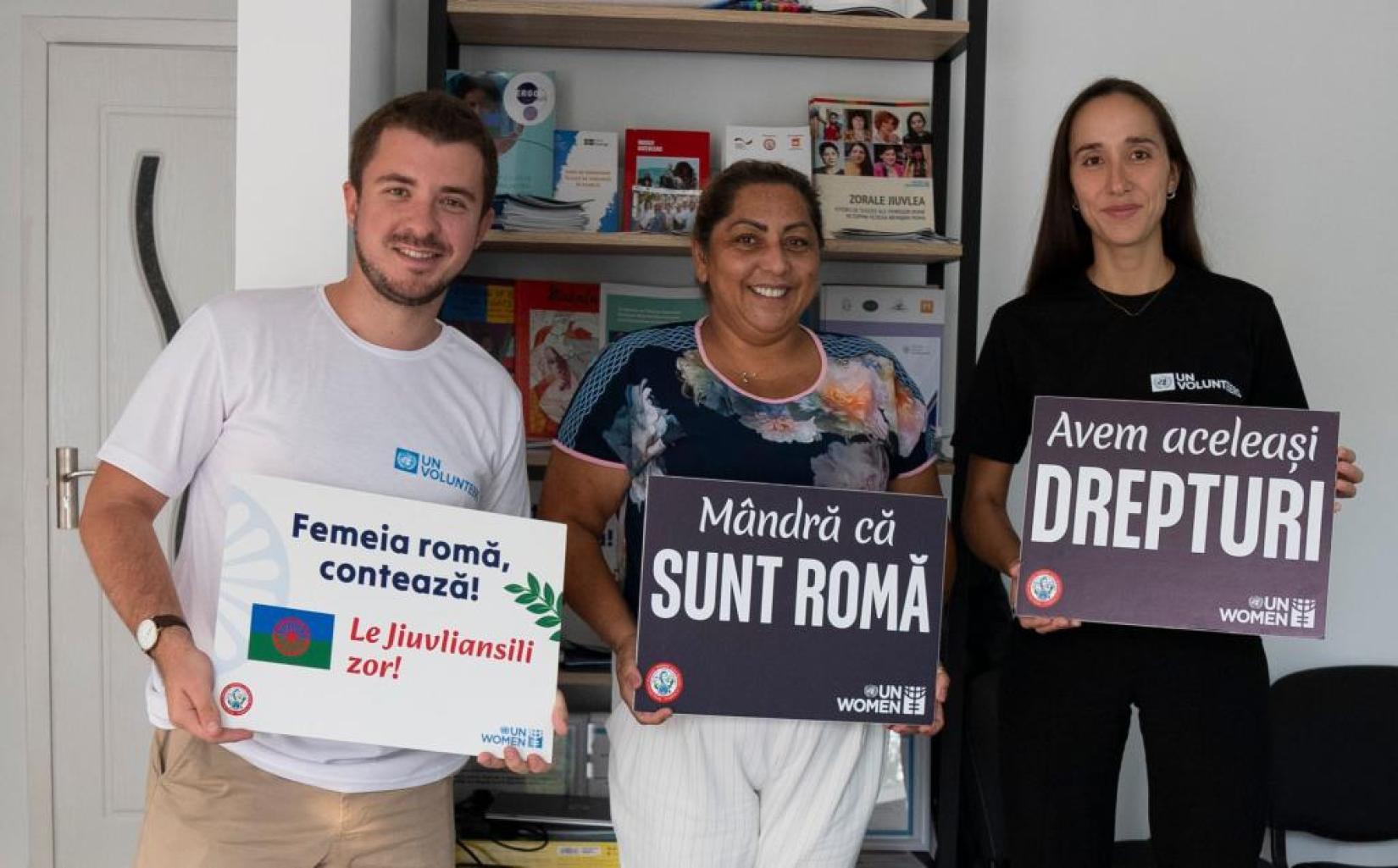Changing social behaviours for the rights of Roma

Laure Anne Storne and Mihail Platinda are UN Volunteers.
The focus of their volunteer assignments—to work with Roma communities in the Republic of Moldova and promote their integration into UN programmes and initiatives. On Human Rights Day in particular, we acknowledge the importance and relevance of human rights in our everyday lives, and for societies to be more peaceful, equal and sustainable.
Laure is a fully funded UN Volunteer from France who started her assignment in September 2023. She joined the United Nations Resident Coordinator Office (UNRCO) team as Vulnerable Groups Inclusion Associate and began working with groups identified as vulnerable in the evidence-based country document, which assesses the situation on the ground.
Initially, Laure mapped joint programmes supporting Roma populations with a specific focus on women and girls as they faced additional challenges in access to education, healthcare and employment.
Roma are one of the most discriminated against group in the Republic of Moldova and they face a lot of obstacles in access to public services. And this we know. But what we were trying to understand was what are the root causes of those obstacles that we know about?” Laure Anne Storne, fully funded UN Volunteer with UNRCO.
Laure underlined the causes of discrimination and inequality as intersectional—resulting in a high-level of poverty among the Roma community, with many households facing limited access to safe water, sanitation and electricity.

As Roma Inclusion Specialist with the United Nations Children's Fund (UNICEF), Mihail focused particularly on the inclusion of Roma children through education and social behaviour change. He started his volunteer assignment in January 2024.
Mihail raised awareness among organizations and institutions about the specific needs of Roma children and to prevent their bullying in schools. He also conducted health campaigns and training for teachers.
People should keep in mind that children are more vulnerable than the others. The programmes should be designed differently. Roma children should be included in the existing programmes, and some positive measures should be taken to improve their situation.” Mihail Platinda, UN Volunteer with UNICEF.
Laure and Mihail visited six districts where Roma people live to assess their situation and needs firsthand. “In some particular cases in different regions, the problems and challenges are different. By covering three regions like north, central and south, we can also track and see the differences between the challenges,” Mihail shared.
“We realized that we needed to go to the field and be closer to the community, and understand their challenges at the local level. Seeing the Roma mediators’ dedication and all the work they do to support the families, enrollment in schools, and access to health care was very impressive.” Laure Anne Storne, fully funded UN Volunteer with UNRCO.
Elena Sirbu is from the Roma community. She is also a Roma activist and collaborated with Laure and Mihail on primary research. “Targets of negative stereotypes and hate speech, and constrained by a patriarchal system, most of Roma fell into illiteracy. This left a deep mark on Roma in Moldova and deepened the vulnerability of Roma women.” Elena explained.
A group of Roma women, including Elena, founded the Roma Women Platform 'ROMNI' aimed at supporting the rights of Roma women. ROMNI gives vocational training to the Roma women, organizes awareness-raising sessions for local government, and supports the role of the mediators in making decisions for Roma at the municipal level. This advances Sustainable Development Goal 5—gender equality, increasing Roma women’s representation at the local level, addressing gender-based violence and preserving the culture, heritage and language of Roma people.
Elena Sirbu is also the Head of ROMNI. “The integration of Roma people cannot be pursued successfully without the involvement of Roma experts. ROMNI has developed strategies to improve the quality of life of Roma women, all with the help of partners and allies, and in the longer term, to support Roma women to become leaders at the local and national level, and to draft a new law on anti-Gypsyism so that ethnic discrimination can have penal consequences.”
Through consultations with Roma people from small villages to cities, Laure and Mihail identified best practices and challenges. The data gathered from the field will help raise awareness, guide the following steps and shape more supportive programmes. “This is long-term change because we're talking about changing social behaviours as a whole and the attitude of people towards the Roma community,” Laure shared.
Maha Damaj, the UNICEF Moldova Representative, highlighted the valuable and enduring partnerships they have formed with UN Volunteers. She emphasized how these collaborations have played a crucial role in enhancing the inclusivity and accessibility of the United Nations, as well as in advancing sustainable development goals.
UN Volunteers are closer to the beneficiaries we need to reach. Development relies on volunteerism. They look at everything we’re doing and propose an action plan to refine our programmes and focus to reach all Roma children in a way that we would hope to make a difference.” Maha Damaj, Representative of UNICEF Moldova.
***
Source: UN Volunteers web page





